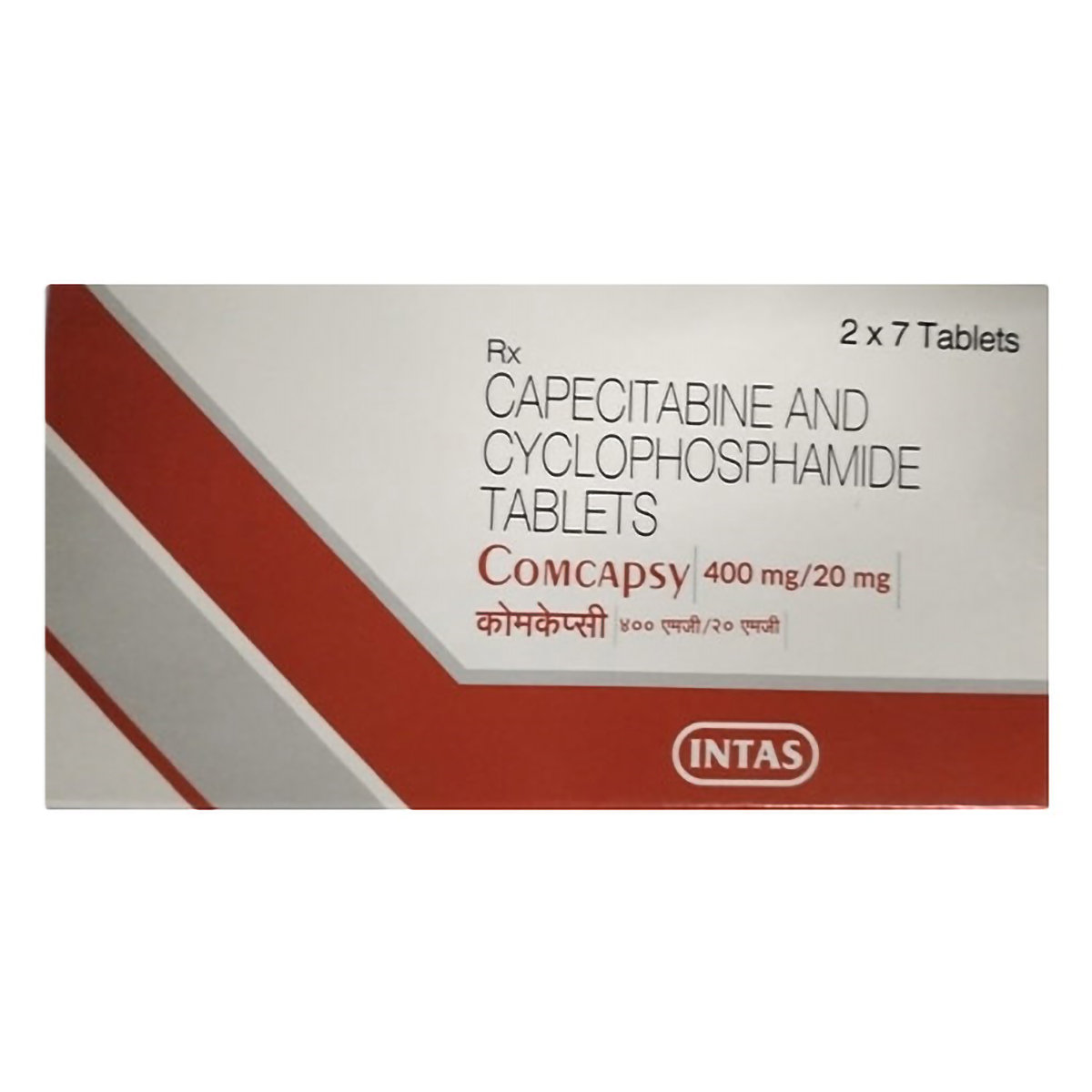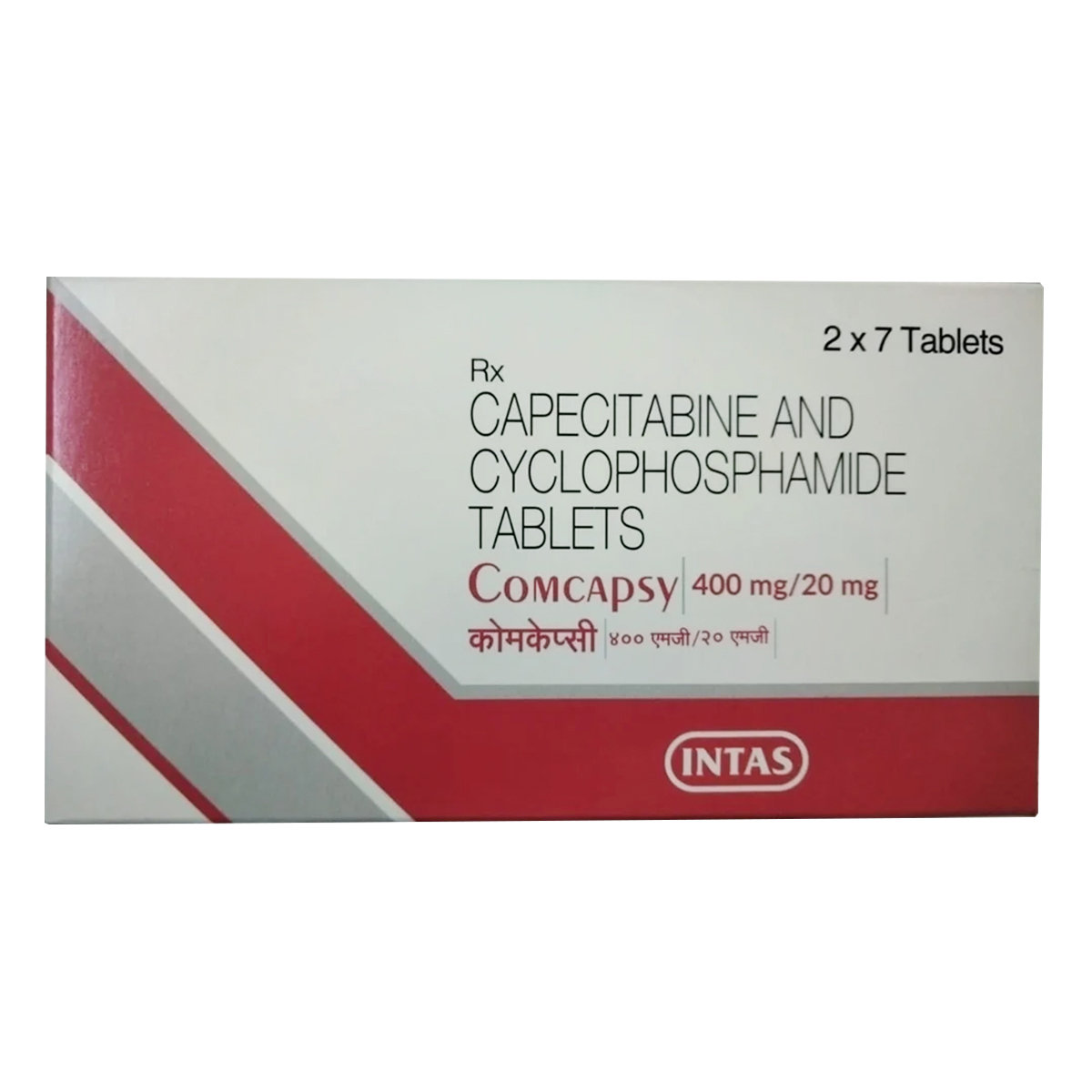Capecitabine+cyclophosphamide
About Capecitabine+cyclophosphamide
Capecitabine+cyclophosphamide belongs to a group of medications called 'antineoplastic agents,' primarily used to treat metastatic breast cancer. Cancer occurs when cells in a specific body part grow and reproduce uncontrollably. The cancerous cells can attack and destroy surrounding healthy tissues and may sometimes spread to other areas of the body (known as metastasis).
Capecitabine+cyclophosphamide contains two anticancer medications: Capecitabine (an antimetabolite) and Cyclophosphamide (an alkylating agent). Both drugs exhibit potential synergistic effects; Cyclophosphamide boosts the activity of an enzyme (thymidine phosphorylase) that helps convert Capecitabine into its active form, 5-fluorouracil. They work by damaging the genetic material of cancer cells to stop their growth and multiplication. Thus, Capecitabine+cyclophosphamide helps treat cancer by killing cancer cells.
You are advised to take Capecitabine+cyclophosphamide for as long as your doctor has prescribed it, depending on your medical condition. In some cases, you may experience common side effects, such as nausea, vomiting, loss of appetite, diarrhoea, stomach pain, skin rash, weakness, tiredness, mouth sores, hair loss, fever, low blood cell count, and hand-foot syndrome (swelling, redness, and peeling on palms and soles). If you experience any of these side effects, do not hesitate to report them clearly to your doctor.
Do not use Capecitabine+cyclophosphamide if you are allergic to any of its ingredients, fluorouracil, other cancer medicines, or have severe kidney disease or bladder obstruction. Inform your doctor before taking Capecitabine+cyclophosphamide if you had treatment with chemotherapy and radiation or have certain medical conditions, including metabolic disorders, chronic infection, a weakened immune system, urination problems, or heart, lung, liver, or kidney diseases. Tell your doctor if you are taking any blood thinners (warfarin) before using Capecitabine+cyclophosphamide, as it may increase the risk of severe bleeding. Avoid taking Capecitabine+cyclophosphamide if you are pregnant or breastfeeding, as it may cause harmful effects on the baby. Capecitabine+cyclophosphamide may cause dizziness or vision problems, so avoid driving and operating machines until you are fully alert.
Uses of Capecitabine+cyclophosphamide
Medicinal Benefits
Capecitabine+cyclophosphamide is an anticancer medication primarily used to treat metastatic breast cancer. It is also used in combination with other medicines to treat various types of cancer, as advised by a doctor, including colorectal, colon, stomach, pancreatic, and ovarian cancer. It contains Capecitabine (an antimetabolite) and Cyclophosphamide (an alkylating agent). Both work by damaging the genetic material of cancer cells to stop their growth and multiplication. Thus, Capecitabine+cyclophosphamide effectively treats cancer by killing cancer cells.
Directions for Use
- Take Capecitabine+cyclophosphamide within 30 minutes after meals or as advised by your doctor.
- Follow your doctor’s instructions on the dosage and timing of this medication to ensure safe and effective use.
- Swallow Capecitabine+cyclophosphamide as a whole with a glass of water.
- Do not crush, chew, or break it.
Storage
Side Effects of Capecitabine+cyclophosphamide
- Nausea and vomiting
- Loss of appetite
- Diarrhoea
- Stomach pain
- Skin rash
- Weakness
- Tiredness
- Mouth sores
- Hair loss
- Fever
- Low blood cell count
- Hand-foot syndrome (swelling, redness, and peeling on palms and soles)
Drug Warnings
Do not take Capecitabine+cyclophosphamide if you are allergic to any of its ingredients, fluorouracil, other cancer medicines, or have severe kidney disease or bladder obstruction. Tell your doctor if you are taking prescription or non-prescription medications, vitamins, or herbal supplements to rule out any side effects and interactions. Additionally, inform your doctor before taking Capecitabine+cyclophosphamide if you had treatment with chemotherapy and radiation or have certain medical conditions, including metabolic disorders (such as dihydropyrimidine dehydrogenase deficiency), chronic infection, a weakened immune system, decreased bone marrow function (such as leukopenia, anaemia, thrombocytopenia), dehydration, urination problems, or heart, lung, liver, or kidney diseases. Tell your doctor if you are taking any blood thinners (warfarin) before using Capecitabine+cyclophosphamide, as it may increase the risk of severe bleeding. Exercise caution when using sharp objects like nail cutters and razors to minimize the risk of injury or bruising. Avoid taking Capecitabine+cyclophosphamide if you are pregnant or breastfeeding, as it may cause harmful effects on the baby. Use birth control pills while taking Capecitabine+cyclophosphamide and for 6 months after your last dose to prevent pregnancy. Capecitabine+cyclophosphamide should be used with caution in elderly patients over 60 years. Capecitabine+cyclophosphamide may cause dizziness or vision problems, so avoid driving and operating machines until you are fully alert.
Drug Interactions
Drug-Drug Interactions: Capecitabine+cyclophosphamide interacts with certain medications, such as blood thinners (warfarin, dicumarol), antigout drugs (allopurinol), antiseizure drugs (phenytoin), vitamin B9 (folic acid), vaccines (polio vaccine, influenza virus vaccine, dengue vaccine), medicines used to reduce the harmful effects of anti-cancer drugs (leucovorin), antiviral drugs (nadofaragene firadenovec), immunosuppressive medications (azathioprine), and other anti-cancer medications (folinic acid, oxaliplatin, bevacizumab, cisplatin, irinotecan, tamoxifen).
Drug-Food Interactions: No interactions were found/established.
Drug-Disease Interactions: Capecitabine+cyclophosphamide should not be given to patients with severe kidney disease or bladder obstruction. Inform your doctor before taking Capecitabine+cyclophosphamide if you have any medical conditions, such as metabolic disorders (dihydropyrimidine dehydrogenase deficiency), chronic infection, a weakened immune system, decreased bone marrow function (such as leukopenia, anaemia, thrombocytopenia), dehydration, urination problems, or heart, lung, liver, or kidney diseases.
Drug-Drug Interactions Checker List:
Safety Advice

Alcohol
cautionIt is unknown whether alcohol interacts with Capecitabine+cyclophosphamide. However, it is advisable not to consume alcohol as a precautionary measure.

Pregnancy
unsafeCapecitabine+cyclophosphamide should not be used during pregnancy, as it may cause harmful effects on the baby. You are advised to avoid pregnancy by using birth control pills during treatment with Capecitabine+cyclophosphamide and for 6 months after your last dose.

Breast Feeding
unsafeCapecitabine+cyclophosphamide should not be taken during breastfeeding, as it passes into the breast milk and may harm the baby. You are advised to stop breastfeeding during treatment with Capecitabine+cyclophosphamide and for 2 weeks after your last dose.

Driving
cautionCapecitabine+cyclophosphamide may cause dizziness and vision problems. Therefore, avoid driving and operating machines until you are fully alert.

Liver
cautionCapecitabine+cyclophosphamide may sometimes cause harm to the liver or increase bilirubin levels in the blood. If you have a history of liver disease, please inform your doctor before taking Capecitabine+cyclophosphamide. Your doctor may need to adjust the dose of Capecitabine+cyclophosphamide.

Kidney
cautionCapecitabine+cyclophosphamide may sometimes cause harm to the kidney. If you have a history of kidney disease, please inform your doctor before taking Capecitabine+cyclophosphamide. Your doctor may need to adjust the dose of Capecitabine+cyclophosphamide.

Children
unsafeCapecitabine+cyclophosphamide should not be used by children under 12 years, as its safety and effectiveness have not been established in this age group.
Habit Forming
Diet & Lifestyle Advise
- Incorporate leafy vegetables, fatty fish, citrus fruits, yogurt, berries, apples, cauliflower, peaches, cabbage, broccoli, beans, herbs, and spices into your diet.
- Avoid fast foods, fried foods, processed meats, refined carbs, and added sugar.
- Avoid smoking and excessive alcohol consumption.
- Exercise at least 30 minutes on most days of the week.
- Maintain a healthy weight and seek professional advice for weight loss.
- Get enough sleep and rest for effective recovery.
- Ask your doctor about when to start breast cancer screening and perform breast self-exams to notice any changes or lumps.
Special Advise
- Monitoring of complete blood count, electrolytes, and liver and kidney function while taking Capecitabine+cyclophosphamide is advised.
- Drink plenty of fluids to prevent dehydration and urinary problems.
- Consult your doctor immediately if you notice any signs of infection, such as fever, chills, sore throat, diarrhoea, etc.
Patients Concern
Disease/Condition Glossary
Breast cancer: It is a type of cancer that develops due to the uncontrolled growth of cells within the breast tissue. Breast cancer may form in the lobules (glands that produce milk), ducts of the breast (the pathways that carry milk from the glands to the nipple), or the fatty and fibrous connective tissue within the breast. Sometimes, the cancer cells invade other healthy breast cells and travel to the lymph nodes or other body parts (metastasis). Symptoms of breast cancer include a lump in the breast or tissue thickening that feels different than the normal surrounding tissues, breast pain, redness, swelling, and nipple discharge other than breast milk.
FAQs
Capecitabine+cyclophosphamide is an anticancer medication primarily used to treat metastatic breast cancer. It is also used in combination with other medicines to treat various types of cancer, as advised by a doctor, including colorectal, colon, stomach, pancreatic, and ovarian cancer.
Capecitabine+cyclophosphamide contains two anticancer medications: Capecitabine (an antimetabolite) and Cyclophosphamide (an alkylating agent). Both drugs exhibit potential synergistic effects; Cyclophosphamide boosts the activity of an enzyme (thymidine phosphorylase) that helps convert Capecitabine into its active form, 5-fluorouracil. They work by damaging the genetic material of cancer cells to stop their growth and multiplication. Thus, Capecitabine+cyclophosphamide helps treat cancer by killing cancer cells.
Capecitabine+cyclophosphamide may cause common side effects such as nausea, vomiting, loss of appetite, diarrhoea, stomach pain, skin rash, weakness, tiredness, mouth sores, hair loss, fever, low blood cell count, and hand-foot syndrome (swelling, redness, and peeling on palms and soles). If you experience any of these side effects, do not hesitate to report them clearly to your doctor. Your doctor may suggest lifestyle changes, medications, and supportive therapies to help reduce discomfort and improve your quality of life.
Do not stop taking Capecitabine+cyclophosphamide on your own without consulting your doctor, as it can affect your treatment and recovery. You are advised to take Capecitabine+cyclophosphamide for as long as your doctor has prescribed it, depending on your medical condition, for effective treatment of cancer.
Yes, Capecitabine+cyclophosphamide may impair fertility by temporarily stopping sperm production in men and disrupting normal menstrual periods in women. Therefore, consult your doctor for advice before taking Capecitabine+cyclophosphamide if you are planning to have a child. Also, it is important to use birth control pills while taking Capecitabine+cyclophosphamide and for 6 months after your last dose to prevent pregnancy.
Capecitabine+cyclophosphamide might cause myelosuppression (reduced bone marrow function) leading to a decrease in white blood cells. This could lead to an increased risk of infections. You are advised to get regular blood tests while taking Capecitabine+cyclophosphamide.
Yes, Capecitabine+cyclophosphamide contains two chemotherapy medicines: Capecitabine, which is an antimetabolite, and Cyclophosphamide, which is an alkylating agent. They work by destroying cancer cells.
Capecitabine+cyclophosphamide may cause weight loss due to decreased appetite and may also be a result of the underlying cancer. Please consult your doctor if you experience significant weight loss while using Capecitabine+cyclophosphamide.




